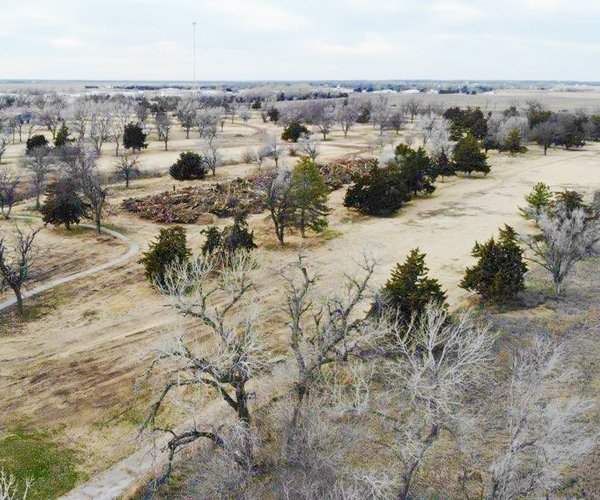By moving Food for Peace to USDA, the program can continue to equip American producers to serve hungry people while providing more transparency and efficiency as to how taxpayer dollars are stewarded.Rep. Tracey Mann
The farming community believes in raising the crop and providing things for the world and for other people to be able to prosper themselves. We’ve been the breadbasket of the world for years, and that hasn’t changed.PCCA CEO Kim Barnes
WASHINGTON, D.C — The shuttering and impending dismantlement of the U.S. Agency for International Development is not only causing a stir among the world’s recipients of U.S. assistance, but it has also become an issue here at home, in the heart of the nation’s breadbasket.
Citing fraud and corruption within the agency created by President John F. Kennedy in 1961, President Donald Trump’s Jan. 20 executive order shut down USAID, placing an unprecedented 90-day freeze on foreign assistance in his first day of office.
The freeze attempted to place some 2,200 USAID employees on administrative leave or evacuating them from their host countries, but that move has been barred by Judge Carl Nichols, appointed by Trump in his first term, by a limited temporary restraining order that is due to expire at midnight on Feb. 14.
While USAID has run Food for Peace, USDA has run two other international food assistance programs, including the McGovern-Dole Food for Education program named in part after former U.S. Sen. Bob Dole. Food for Peace uses taxpayer dollars to buy American agricultural surplus to use as foreign food aid. The program is intended to fight world hunger, expand international trade and advance foreign diplomacy.
Rescuing Food For Peace
On Tuesday, a group of U.S. Representatives led by Kansas First District Rep. Tracey Mann, R-Salina, alongside U.S. Senators Jerry Moran, R-KS and John Hoeven, R-ND, introduced legislation to move the administration of the Food for Peace program, as a part of USAID, from that agency to the U.S. Department of Agriculture.
The bill does not appear to include Feed the Future, another USAID program that has awarded tens of millions of dollars to Kansas State University for agricultural research.
“For 70 years, Kansas and American farmers have played an active role in sending their commodities to feed malnourished and starving populations around the world,” Rep. Mann released from his Washington office on Tuesday.
“This free gift from the American people is more than food. It’s diplomacy and feeds the most vulnerable communities while helping them recognize the freedom, prosperity, and good America can establish across the globe. By moving Food for Peace to USDA, the program can continue to equip American producers to serve hungry people while providing more transparency and efficiency as to how taxpayer dollars are stewarded. I will continue to work with the Trump Administration to uproot wasteful spending while ensuring America can continue to be the beacon of hope and freedom we are to the rest of the world.”
Co-sponsors of the bill include Reps. Rick Crawford, R-Ark., Dan Newhouse, R-Washington, David Rouzer, R-NC. and House Agriculture Committee Chairman G.T. Thompson, R-PA.
“Food for Peace is a critical program for American farmers and has a proven track-record of successfully feeding people all over the world,” said Rep. Crawford. “I am encouraged by the Trump Administration taking a fresh look at how we provide foreign assistance, including Food for Peace. I believe a move from USAID to USDA would make program administration more efficient and more in-line with America’s priorities. USDA already runs two international food assistance programs that deal with in-kind food donations, Food for Progress and the McGovern-Dole Food for Education program. This makes USDA a natural home for Food for Peace.”
“Kansas has a long history of providing food to the hungry beginning with a Kansas farmer suggesting the U.S. provide surplus grain to countries in need, to President Eisenhower establishing the resulting humanitarian aid program, to Senator Bob Dole’s expanding Food for Peace, to the farmers who grow the crops that feed the world,” noted Sen. Moran. “As part of an ongoing effort to save money and increase efficiency, Food for Peace should be moved to the U.S. Department of Agriculture. By moving this program closer to the producers who grow these crops, we can help reduce waste and make certain our farmers have access to this valuable market. Food stability is essential to political stability, and our food aid programs help feed the hungry, bolster our national security and provide important markets for our farmers.”
Rep. Mann said that for the past 70 years, America’s farmers, millers, shippers, and dockworkers have served at the helm of combatting international hunger as Food for Peace has fed more than 4 billion people in more than 150 countries, noting more than 50 organizations support his legislation.
“Kansas farmers take great pride in Food for Peace and the impact the program and American commodities have had on feeding the world,” said Chris Tanner, Kansas Association of Wheat Growers President. “Moving Food for Peace to USDA would continue to provide the needed relief for people in need. Thank you to Senator Moran and Congressman Mann for leading the way on this issue.”
“Kansas-grown sorghum is a critical crop for food security in America and abroad,” said Adam York, CEO of Kansas Sorghum Producers Association. “Throughout changes in administrations, sorghum farmers have worked to have a seat at the table in international food programs housed across many agencies to ensure America’s farmers can contribute to our national security. We recommend policy makers continue prioritizing American agriculture as a solution to challenges in domestic and foreign policy.”
“U.S. soybeans play an important role in addressing global hunger,” said Caleb Ragland, president of the American Soybean Association and a soybean farmer from Kentucky. “Soybeans are the only plant-based protein that provides all nine amino acids essential for human health, and our farmers have been proud to support international food assistance programs. ASA strongly supports efforts to protect these programs and to ensure U.S. grown commodities continue to feed vulnerable populations around the globe. We thank Representative Mann and Senator Moran for their leadership on this important issue.”
“National Sorghum Producers supports this legislation that would move U.S. food aid programs under the U.S. Department of Agriculture — a move that makes sense and would ensure the long-term viability and success of these programs by continuing to provide a critical market for American sorghum farmers and the ability to move grain from our fields to the hands of those in need around the world,” said Amy France, National Sorghum Producers Chairwoman.
“Our nation’s millers take great pride in feeding those facing famine emergencies around the world,” said Kim Z Cooper, Vice President of Government Affairs for the North American Millers’ Association. “Our flagship emergency food aid program Food for Peace not only helps those abroad, but is a critical component of Buy American and America First policies. We applaud Representatives Mann (R-KS), Thompson (R-PA), Crawford (R-AR), Newhouse (R-WA), Rouzer (R-NC), and Senators Moran and Hoeven for introducing legislation that would allow Food for Peace to operate under USDA, and reinstate this critical, life-saving program.”
Rep Mann has continuously championed Kansas’ leadership in the U.S. fight against world hunger. In June 2023, Rep. Mann introduced legislation to reform Food for Peace and ensure that U.S. grown commodities remained the cornerstone of international food aid. Much of that legislation was seen in the House Agriculture Committee’s Farm, Food, and National Security Act. In November 2022, Rep. Mann hosted ‘Thank the American Farmer’ in Salina, Kansas to pay tribute to the rich history of Kansas agriculture’s role in feeding the world.
Preserving a Kansas legacy
Rescuing the Food for Peace program and placing it within USDA’s administration is an important step in keeping an export market for grain sorghum. While the U.S. is the world leader at 14% of global sorghum production, Kansas produces 57% of the sorghum grown in this country.
Grain sorghum, or milo as it is known by most Kansas producers, is primarily used for livestock feed and ethanol production, but is becoming popular in the consumer food industry and other emerging markets. Overseas, sorghum is well known as an ancient, sustainable, gluten-free grain with a mild, earthy flavor similar to wheat berries. Chefs around the world know it as a flexible ingredient that is used in a variety of preparations.
Shutting down Food for Peace would adversely affect Kansas producers, who turn to milo as a common follow planting in their annual crop rotation. Because it requires less water to produce, it has been championed by growers, especially in drought-stricken central and western Kansas.
But because Kansans grow it, they are also harvesting and storing it. Kansas currently has more than 150 million bushels of sorghum held at mills, elevators, warehouses, terminals and processors according to USDA grain stock data. The total nationwide, incidentally, is 210 million bushels.
Dismantling a potential sorghum market outlet along with USAID would be a bad move, noted Pawnee County Co-op Association CEO Kim Barnes.
Barnes, who has spent 51 of his 70 years at PCCA purchasing and selling grain, is continuously on the lookout for grain contracts. Sometimes, that means selling to Food for Peace, when the organization makes the call. Sometimes, they sell to brokers. Other times, directly to an export house, and they then make the contract with the government. From there, the grain is loaded on a ship and sent overseas.
Barnes explained that taxpayer dollars pay the American agriculture industry for the food that is used in foreign aid. The way the USAID program has worked in the past, he noted, is the government, through the U.S. Department of Agriculture, sends out a call for contract.
If the government doesn’t buy sorghum to use as food aid, grain elevators and others in the industry could find themselves stuck with last year’s harvest filling up space — and potentially costing them storage interest — heading into this year’s growing season.
“I’ve gotten these contract proposals for many years,” Barnes said. “They tell you what they’re looking to buy and the destination and how much they’re looking to buy.”
“Right now, there’s no other export market for it, and there’s no domestic market,” Barnes said. “We were hoping there’d be another one with as much milo as we have.
“The market is just not there to sell it. We’ve been buying milo from our producers all along. We have a tremendous company-owned position at this point, just nobody on the other side to sell it to. And it’s just not country elevators, it’s terminals, it’s everybody, because there’s just no other market in the world today for milo.
“It won’t go bad — we know how to maintain grain — but storage space is going to get tight,” Barnes said.
PCCA’s elevator has storage capacity of 6 million bushels, Barnes said. About 2.5 to 3 million of that is currently full, and the majority of that is sorghum. Compared to this time in past years, grain storage is typically around 2 to 2.5 million, with sorghum accounting for a smaller share.
“This is just a milo issue,” he said. “Because corn, soybeans and wheat are finding homes elsewhere. If we can’t get a chance to move this milo, the basis on milo is just going to deteriorate farther as we get into the future months,” Barnes said. “Because if there’s no place to go with it, we can’t buy something that we can’t get fair value on the other side.”
“Putting Food for Peace under the USDA is probably the best place to go for it. That is certainly better than just having it go away,” Barnes said.
‘The breadbasket of the world’
Barnes, from the co-op in Pawnee County, echoed the thoughts shared in Congress.
“My concern is these will be potential markets that we’ll lose, and people will go hungry,” Barnes said. “They’ll look for other sources, and will those other sources not be what we need for safety? We also need to take care of those in need.”
Barnes said that foreign food aid opens the door for long-term benefit in exports. “In other words,” he said, “taking that development of that country, getting it on its feet — helping people to be better economists in their countries —carries the idea that ‘we help you today, get you back on your fee and you could be a purchaser down the road.’
“The farming community,” he added, “believes in raising the crop and providing things for the world and for other people to be able to prosper themselves. We’ve been the breadbasket of the world for years, and that hasn’t changed.”





